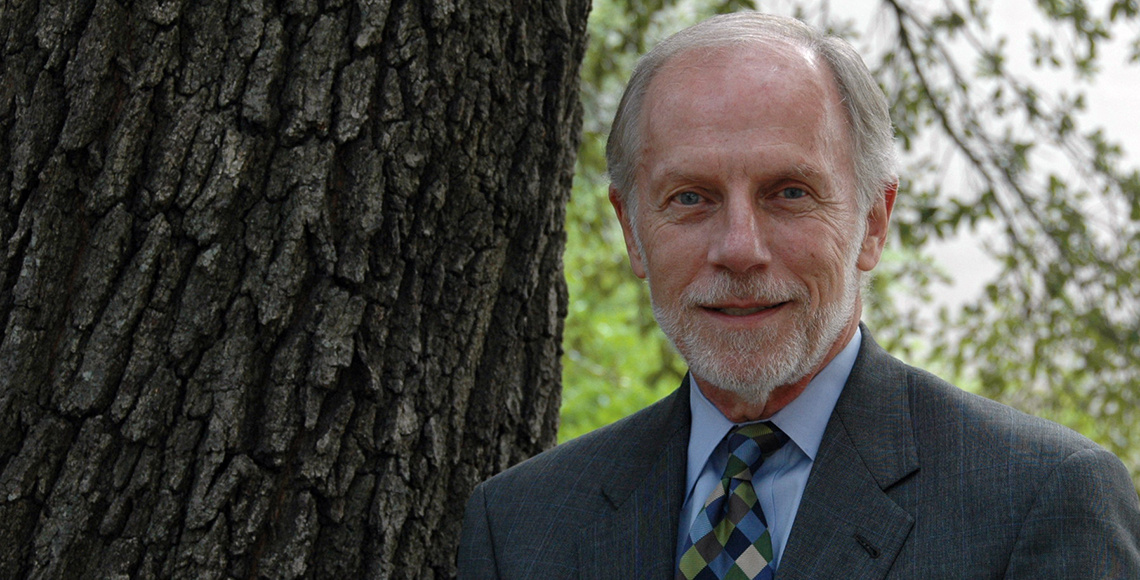Charles Bierbauer, distinguished professor and dean emeritus of the College of Information and Communications at the University of South Carolina, passed away Friday, Aug. 29. His lengthy career in journalism and higher education was filled with honors and achievements, many of which are beautifully captured in his obituary. These include multiple Emmy Awards and the Order of the Palmetto, the governor’s highest civilian honor.
But what we really want to share here are glimpses of how he touched people’s lives during his time at the college.
To his students and colleagues, Charles was more than a dean or professor — he was a teacher in the truest sense of the word. One colleague put it simply: “He may have been the dean of the college, but his heart was in teaching.” His students often recall how his classes challenged them to think bigger, reach further, and believe in their own potential. Many credit him with sparking the passion that guided their careers and the confidence that carried them forward.
Charles Bierbauer Scholarship
A private service will be held by the family in the coming weeks. The family has requested that memorial contributions be made to the Charles Bierbauer Scholarship.
Tom Reichert, succeeded Bierbauer as dean of the college
We are all surprised and saddened by his passing. Dean Bierbauer was deeply beloved and had a profound impact on the program.

He was the founding dean of the college in its current configuration and was likely the second-longest-serving dean, with 15 years of service. Charles was widely respected and brought national attention to the program. He is fondly remembered for many achievements, including fundraising and supporting students who went on to win Pulitzer Prizes.
However, his role in securing a new home for the School of Journalism and Mass Communications in 2015, on Sumter Street near the Horseshoe, stands out as particularly notable. He will be deeply missed.
Rebekah Friedman, communications coordinator who worked closely with Bierbauer during her tenure at the college
Editor's note: When submitting her tribute via email, Friedman wrote: "Feel free to edit. And please proof! I’ll hear about it from beyond the grave if there’s a typo."
Charles Bierbauer spent decades as a journalist, but his other calling was teaching — not just the classroom kind where he’d regale students with stories about covering presidents, but also the kind where he’d gently offer you valuable maxims. You could use two exclamation marks over the course of your lifetime, not over the course of one email. Images printed on canvas were “ersatz.” Don’t hold a drink in a social media photo.
Not every Charles guideline was followed (looking at you, exclamation marks), but each was deeply appreciated.
Despite being a broadcast reporter by trade, Charles had the eagle-eyed copy editing skills of a seasoned newspaperman. As dean, he always made time to proofread everything on our website. He wasn’t a micromanager; he was just a true journalist who believed deeply that accuracy mattered. One of my favorite memories was when he emailed me (post retirement) to tell me he’d received the college’s alumni magazine and had spotted a typo … but wasn’t going to tell me where. I learned that no matter how thoroughly you’ve proofread something, read it one more time for the error Charles will catch.
He wasn’t one for pomp or flash. In the break room area of the dean’s suite, we had an ancient mini fridge that had belonged to Charles back in his Coliseum days. The fridge was as wood-paneled as a ‘70s station wagon and could probably remember the first Bush administration better than Charles. But it still worked, so when another staffer complained that she had to squat to open it, Charles declined to replace it, saying “Deep knee bends are good exercise.” Lesson here: If it ain’t broke, don’t fix it.
And while he was intensely serious, he was the master of the well-timed moment of levity. When visual communications student Michaela Baker Taylor designed her controversial “We’ve Been Known to Flash People” T-shirt for the journalism school in 2017, we presented Charles with one and joked on Twitter that he’d never wear it. (Honestly, I can’t even believe he let us get away with that design, but it was a few weeks before his retirement, so maybe he decided to let it slide.) Anyway, not one to back down from a challenge, he later replied with a gym selfie— a former White House correspondent, working up a sweat on the treadmill in his “flash people” shirt. I’m not sure there was a lesson here except to expect a twinkle in his eye when he pulled the rug out from under us.
For years after Charles retired, I still got media requests from major news organizations seeking his expertise on presidential politics. And he often still said yes. He retired from being a reporter and a dean, but he never really retired from teaching, from sharing what he knew with others.
I hope the afterlife has a big canister of jellybeans waiting for him — he always kept them in his office, something he picked up from his time covering President Reagan. And I sincerely hope whoever publishes the newsletter knows their grammar and AP style, because if not, a man in a “flash people” T-shirt will be reaching out very soon.
Thanks for everything, Charles. We will never stop missing you.
In other words ...

I have many great memories of serving the university alongside Charles for nine years — first as fellow deans for three years, and then for another six years while I was USC’s provost. He transitioned seamlessly from his high-profile journalism career into academia, where he inspired countless young journalists, including many who are now making their own marks in the field.
Charles was an insightful and energetic contributor in promoting the best interests of not only his college but also the entire University of South Carolina. His very presence on our campus and across our state raised the profile and professionalism of our journalism school. He may not have begun his career as a Gamecock, but he retired as one, and we will forever be grateful for his contributions to USC. Personally, I will miss his global perspective, his wise counsel and his great friendship.

Charles may have been the dean of the College, but his heart was in teaching.
I saw students stream through his office “just to chat” on a regular basis. He always took time for them.
He was a hard grader and a no-nonsense professor. And students loved him. As part of my job, I reviewed everyone’s teaching evaluations.
His were always among the best. Students knew they were learning from a legend.
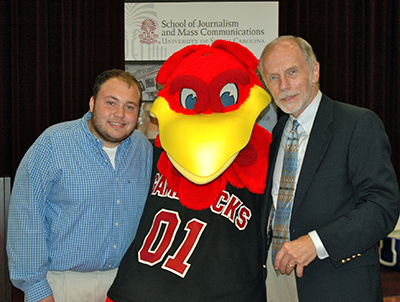
I am going to miss Charles Bierbauer. While I was an undergrad at the University of South Carolina, I spent hundreds of hours annoying (and hopefully sometimes entertaining) the esteemed dean in his corner office in the dungeon-like Coliseum. He always had a wry observation or piece of constructive criticism for me and my work. His door was always open. He encouraged a kid who grew up in rural South Carolina to think more expansively about the world and what I could do with my life.
He’d lived a fascinating and intrepid life in Washington and overseas as an Emmy-winning and widely-acclaimed correspondent for CNN and ABC, and his last professional chapter was dedicated to the next generation. He wanted me to have a meaningful career like his. I talked to him regularly after graduating, often asking his advice, and saw him as often as possible — usually every year or two.
Our last visit was two years ago when he wanted to show me his favorite Italian restaurant in Bethesda. He’d eaten there hundreds of times over the years, and some of the staff remembered Charles and his lovely wife, Susanne.
He was not a man for much emotion, but I knew he loved me. I loved him, too.

My dean was a legend. He covered the biggest stories on the biggest stage. But his second act had the greatest impact on me and new generations of journalists.
Dean Charles Bierbauer was a brilliant and highly skilled journalist who transformed the journalism school at the University of South Carolina while I was there. He brought it into the 21st century which gave me and my fellow journalism students a major head start when we entered the industry. He was an old school professional with new age ideas.
He kept in touch over the years and kept tabs on my career moves especially when I made it to network news based in Washington, D.C. He made time for me when he visited. I loved hearing his stories about his time in local and national news covering the Supreme Court, White House and Pentagon.
In 2003, he took our Maymester class to Washington and we watched as politicians and other journalists treated him like a journalism rockstar. He would joke and say people probably thought he was Wolf Blitzer. He had a wicked sense of humor. During that trip, he introduced me to the phrase “me wall."The dean said politicians, journalists, etc., loved lining their studies or offices with the important people they’ve taken pictures with over the years. Every time I would take a picture with a politician or someone famous, he would say “another one for your me wall.”
Dean Bierbauer was so supportive and kind. I owe my career to him and others at USC’s School of Journalism and Mass Communications. I’m proud to have images of us … on my “me wall.”
RIP, Dean Bierbauer and thank you!
Dean Bierbauer, the founding dean of the then College of Mass Communications and Information Science, appointed me as the founding director of the School of Journalism and Mass Communications in 2003. Together with the founding director of the then School of Library and Information Science, we formed the leadership team for the newly merged college. We were a dream team — two academics with higher education experience, led by a distinguished media professional with broad industry experience and professional ties.
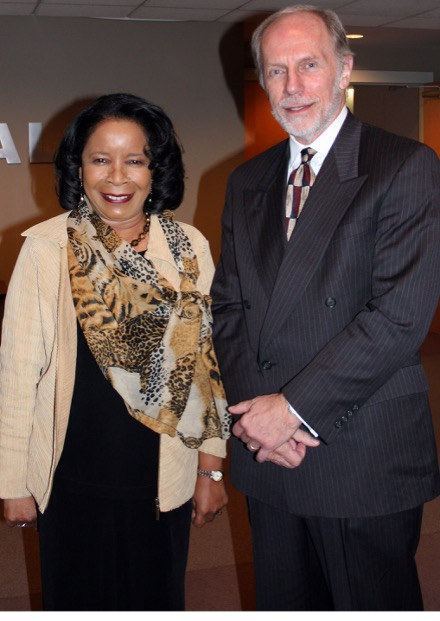
Dean Bierbauer understood the assignment and used his media celebrity and contacts as the chief external advocate for the new college to build strong industry partners and cultivate external donors. The formula was successful as he prioritized the move to a more suitable facility for the SJMC. Dean Bierbauer’s legacy is “the dean who made it happen” — the move to the current state of art facility for the SJMC and CIC. In its prime location at the center of campus, the building supports the nationally accredited SJMC program replete with broadcast and multimedia studios, research and communication labs, used by the college and university.
Dean Bierbauer also realized the importance of collegiality, synergy and symbiosis in the college. We grew as a college under his leadership that laid the foundation for the college’s growth and heightened local, state, regional, national, and international visibility.
We are grateful to Dean Bierbauer and his family.

I’m so terribly sorry to hear this news. Charles was INSTRUMENTAL in my career success, and a personal friend. I am so very grateful for all he brought to our college.
He was a gift that kept on giving, even in his retirement. I just served as director of an honor’s thesis (for Sarah Craft) in which he played a crucial role … as a participant and mentor. Thanks to his guidance, she’s just begun an M.A. in international reporting at the College of Dublin.
He was a remarkable human.

I was deeply saddened to hear of the passing of Charles Bierbauer. Charles took a chance on me in 2014 when he hired me as assistant dean of administration and finance for the College of Information and Communications. His confidence in me and his belief in my abilities shaped the path of my career in ways I will always be grateful for.
Charles was not only a remarkable leader but also a mentor who inspired trust and brought out the best in those around him.
I would not be where I am today without his guidance and encouragement. His legacy of leadership, kindness, and dedication will live on in the many lives he touched. I will miss him, but I will carry forward the lessons he taught me with deep appreciation.

Working with Charles Bierbauer was absolutely wonderful! He understood the importance of libraries, librarians and information scientists and their role in society. He helped us build a robust curriculum that prepared our graduates to flourish in the workplace. He worked hard to make sure our new doctoral program was the best and our students in practice now reflect those efforts.
Dean Bierbauer helped us make Cocky’s Reading Express the cornerstone of literacy in South Carolina and we all understand how important literacy is to success and a good life.
Dean Bierbauer always led with calm intelligence and loved our school. Thank you for the opportunity to work with you!

Charles provided quiet, transitional leadership at a time the journalism program was undergoing significant changes.
For faculty members who labored for years in the windowless bowels of the Coliseum, he will be remembered fondly for bringing the school above ground and back to its historical place on the Horseshoe.

I am so very grateful that Charles chose to make USC his second career home, and that as a result, I had the opportunity to call him friend. His impact on USC will echo across our Horseshoe for generations to come, a legacy built on integrity and on service to our students and state.
His success as a journalist served as the foundation for a personal brand that in some ways was larger than that of our university. He quickly became USC’s credible go-to in reflecting on the events of our time for many local, state and national media. From global politics to Palmetto State stories, he became one of the most recognizable faces and trusted experts of our university.
What the cameras rarely saw, however, was the genuine love Charles had for our students and for their learning. He knew USC was a people business, and he worked tirelessly to make our college better and our students more successful. He created one of the university’s first college-level alumni societies to build a bridge between alumni and students in support of success for both. He created opportunities for those of us who couldn’t afford to write checks that allowed us to do something more, to give of ourselves in building a stronger college for tomorrow’s students. And — his most lasting legacy — was his never-ending quest to get the college out of a windowless edifice and into a visible, state-of-the-art facility adjacent to the historic heart of Carolina.
I will miss his wit, his knowledge, and his understanding of the many complex issues of our day. Most of all I will miss his counsel. Honest, direct, challenging and meaningful beyond measure. I am better for having known him and for having had the blessing of his presence in my career — and in my life.
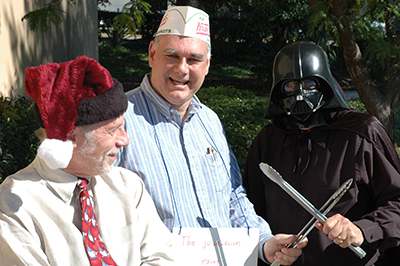
I'm sad to hear that Charles Bierbauer has died at age 83.
The last time I had spoken with him was last year after he and his wife had to leave their home in Spruce Pine, North Carolina, after Hurricane Helene.
Charles was a former AP hand (Pittsburgh 1967-68). Though he came to the AP well before I did, our paths still became intertwined — when he and I worked for Group W in the mid- to late 1970s and then when he became my boss as dean of the School of Journalism and Mass Communications, 2002-17.
Charles was a wonderful journalist and friend. Always had an open door to talk about
the good and bad and to swap stories. Oh did we swap stories.
Charles was the right person at the right time to lead the school because he was passionate
about getting us out of the Coliseum and into a building for the emerging media age.
He always kept the drawings handy in his office and knew just about every square inch.
Combined with his reputation and the relationships he cultivated within the university,
he pulled it off. I'm not sure too many other people could have done that.
My dearest condolences to Susanne and their family. Charles was always dedicated to getting it right and one of those who made journalism a fun and rewarding job to be in.
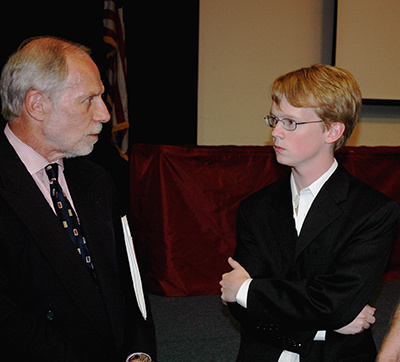
I was a freshman at USC in 2002, the same year Charles Bierbauer arrived to lead the journalism school. Having someone with his experience, gravitas and knowledge in the front office was incredibly empowering. You felt like no matter what the university might have been doing, Dean Bierbauer had a steady hand on our shared wheel.
Bierbauer was there when the Berlin Wall came down. Bierbauer covered presidents. And then Bierbauer was in the catacombs of the coliseum with me, as I smacked the life out of a tape-to-tape machine.
When he came to observe our senior semester broadcasts there was an electricity in the air that kept all of us dialed in — even the kids who'd already decided they were heading for PR or some other tangential field — because Bierbauer was the guy. He inspired you to do your best work and was a paragon of excellence, integrity and class.
Later, during my stint as a TV reporter at WIS (a station I knew he watched) I still felt like Bierbauer was keeping an eye on my work and silently shaking his head when I punched out yet another animal-related feature story. "I hope Bierbauer isn't watching tonight," I'd tell former classmates turned colleagues. We wanted to make him proud.
He was the keeper of the flame, and the fact that he's no longer out there to show us the way is still hard to wrap my mind around. I'm grateful I had the chance to know him, learn from him and laugh with him.
Rest in peace, Dean.
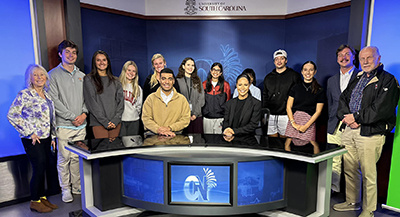
Charles was a fan of the student-run Carolina News show. He watched it most days in his office. If something on the newscast caught his attention, he would often come down to the newsroom to join our critique session and tell students what he liked and what he didn't like ... and how he thought they could improve. Students loved it because this was a former White House correspondent dropping in to talk about their work.
Charles apparently loved it so much he graciously asked to teach in broadcast senior semester and work with the daily news team. It was a lot of fun working with him in the newsroom. He taught with us for two semesters. We saw firsthand how much he enjoyed teaching, coaching and mentoring those students.
Students may not have known, but he followed their careers path. My last communication with him was in July. He wanted me to know that Eva Pilgrim was leaving Good Morning America for Inside Edition. His comment was that he thought she would enjoy the jump and get a lot more exposure. He was very impressed with her work.
I loved working with Charles. He made our newsroom a better place. He had such a huge impact on the lives of so many students and those of us who taught with him. I will miss him.

Dean Bierbauer was the standard bearer for the university's J-school, and what a standard he set. He brought credibility to the place and to my degree from it.
From my freshman year to graduation, his presence in the building was both inspiring and somewhat unnerving. I badly wanted to do work that was worthy of his endorsement, and I craved his feedback — which he was more than happy to give. He was surprisingly accessible, and his advice, which was often rooted in some story from his past, helped shape the course of my career.
After I graduated, I was lucky to continue to stay in touch with Dean Bierbauer by making a few appearances on This Week in South Carolina, which he moderated for S.C. ETV. It was a surreal experience. I remember how proud my parents were to see their son sharing the screen with him.
He was a great journalist and a great guy. I was very sorry to hear of his passing.
Charles Bierbauer brought gravitas, wit, Washington politics and a touch of Hollywood to the journalism school during his time as dean. You could feel it in the air.
With a push from the late Cecile Holmes, Charles brought me on as what was then known as a senior semester instructor after my career in newspapers. I remember Charles smiled enigmatically as an animated Cecile talked me up for the print/digital side of senior semester. He hired me on the spot — for a part-time, one-class gig lodged in the labyrinth of the Coliseum.
When I came onboard full-time, senior semester had new classy digs thanks to the dean’s ingenuity, fundraising and persistence. Charles loved being in that joint television/digital newsroom, and while his heart was in TV news, he never played favorites. He got rock star treatment when he talked to students — a kind of awe fell over the room when he explained how journalism and politics should work.
Twice, he taught a politics class inside senior semester, which meant that students were writing formal papers for him while working in the 9-5, Monday-Friday newsroom and producing daily news assignments.
Once, one of my top digital students came to me with a request: could I act as an emissary to the dean and urge him to lift some of the late-semester paper requirements? “Our heads are exploding,” the student explained. I dutifully relayed the conversation to the dean, including the colorful reference to those collegiate exploding heads. “Well,” Charles said, smiling that same enigmatic smile. “We can’t have that.”
The dean slightly adjusted his requirements, knowing just how much to lift the accelerator. He had a way of encouraging exacting standards while exhibiting warmth and humanity. He will be missed.
In public Charles projected a sense of poise and equanimity. A long and distinguished journalism career interviewing people in positions of power and then a second career herding university faculty taught him to keep his emotional cards on the table. But beneath a sphinx-like mien there was a person of real warmth, humor and passion. He poured himself into his role as cheerleader-in-chief for the college. He faithfully attended every event and always had an articulate and encouraging word to say on our behalf. He may have been the personification of the unbiased, objective journalist of a by-gone era, but he was all in for USC and the college.

Charles hired me to run the School of Library and Information Science (now the School of Information Science). I had such respect for his experience and leadership. He was a great supporter of the school and was generous in his advice and time. He took someone new to the south and new to administration and showed me the value of patience.
Over dinners with Charles and Susanne my wife and I found welcome and wisdom. In leadership meetings I found a model of collegiality.
Charles will be missed.
When I came here to interview for a faculty position in the I-School, the last interview, on the final day, was with Dean Charles Bierbauer. I had an embarrassing "fan girl moment" but still got the job.
While not a journalist, Charles and I often had discussions about information literacy, why and how certain news outlets shared information, and the importance of words and word choices. He was truly dedicated to his profession and willing to indulge my naïve questions. Most importantly, he taught me the power of the exclamation point — a single exclamation point.
When I started taking students abroad, he and I would chat about adventures and stories from our trips. I unexpectedly saw him a while back at the Graduate hotel. He was reading in a corner waiting for his room, and I was grabbing a coffee between meetings and class. We chatted about study abroad, our mutual love of Iceland, and, of course, the news. Before I left, he asked me if I liked my job. I told him, "I love it." He said, "Good. That's important."
Thank you, Dean Bierbauer, for being a part of the job I love!
The date is Wednesday, Nov. 9, 2016 — a historic election result comes in that would shape the political landscape in ways we have never experienced. I was producing our student newscast. Offering guidance and feedback over my shoulder was a political journalism legend who spent over two decades at CNN as the Pentagon correspondent, senior White House correspondent, and senior Washington correspondent.
For a man with so much experience speaking on television, he wasn’t a man of many words, and the ones Charles Bierbauer shared were intentional. When he spoke, you wanted to soak up every bit of expertise like a sponge.
“Everyone wants to report on sports. Politics are the same.”
I learned a lot from producing that specific newscast, with him sharing direct feedback, and I credit that day with the shift in my career trajectory to become a news producer who was absolutely enamored with political coverage.
I would go on to intern for Dean Bierbauer’s SCETV show in its inaugural season, providing him notes and research and working alongside him to highlight state issues in conversation with state leaders. It was the greatest honor of my collegiate career.
On a lighter note, I can still remember the feeling of pride when I’d make him crack his firm exterior, whether it over banter about his disdain of exclamation points and my love of them (!!!!!) or my silly little state fair food report, where he kindly mocked my “mmmm that’s really good” reaction to every. single. bite.
I would not be where I am today without his mentorship, and I am positive I am one of many who feel that way.
The world lost a champion for journalism and the free press, but his legacy lives on through the students who grew under his leadership and guidance.
Thank you, Dean Bierbauer.
Charles Bierbauer was perhaps the biggest reason why I chose to attend the University of South Carolina.

I’ll never forget coming down to Columbia as a high school student and aspiring journalist and being seated next to him — THE Charles Bierbauer, highly-respected ABC & CNN reporter — at a scholarship dinner. The opportunity to learn from someone like that was one I could not turn down, and it was the best choice I ever made.
In addition to always offering an ear to listen and a kind, wise word throughout my four years at USC, Dean B. taught Media and Politics 2012. He carted a bus full of us journalism students to Washington, D.C. on spring break that year, giving us unthinkable access to journalists and politicians.
His leadership at SJMC set its students up for success and gave them an alma mater recognizable as one of prestige in newsrooms across the U.S.
Dean B.’s mentorship didn’t end at graduation. I’ve called on him a number of times throughout my career, and each time, he offered that same kindness, wisdom and guidance. Dean B. was the epitome of a role model for journalists, and his leadership, mentorship, friendship and rare, but genuine, smiles, will truly be missed.
Dean Bierbauer was the first to interview me for an assistant professor position at the then School of Library and Information Science. Though I was initially nervous due to his reputation, he asked insightful questions and soon put me at ease.
I appreciated his intellect and keen sense of humor throughout the years I worked for him. Charles had a significant influence on my career, and I will always be grateful for his support. It was a privilege to work under his leadership.

Charles Bierbauer has been a constant throughout my academic career, and I am going to miss his wisdom and counsel immensely.
Charles took a chance on me several times, providing avenues for professional growth as well as supporting and guiding me through numerous leadership opportunities.
I was a newly minted Ph.D. and he was the inaugural dean of our newly formed college when I was hired as an assistant professor in the School of Journalism and Mass Communications. As a young professor, I was initially somewhat intimidated by his presence — his standards were high, and he kept his emotions in check and his opinions to himself. It could be difficult to know exactly what he was thinking.
But what I quickly learned was that Charles was a leader who knew the importance of showing up for other people — his staff, his faculty and his students. And he didn’t rely on a slew of support staff to do the work. After decades as a high-level journalist, he was used to long hours and hard work. He loved to write and serve as a mentor. To this day, I don’t know of anyone who has a quicker response time to emails, despite the large volume he received daily. His email correspondence was detailed, insightful and sometimes a little painful. Charles was not afraid to tell you exactly what he thought about an idea you considered brilliant or an article you were writing. My work always benefited from his guidance and excellent copyediting.
As I was rising through the ranks, from assistant, associate and, finally, to “full” professor, what I remember most about Charles during this time was that he was a steady supporter of our faculty and was always present at those important moments. When presenting at an academic conference or being recognized for an achievement, I would glance out at the audience, see his face and be surprised that he knew about, and took time out of his busy schedule to attend, my seemingly insignificant event.
Charles hired me as the interim director of the School of Journalism and Mass Communications in 2015 and then the permanent director in 2016. It was during this time, which included a move to our new building and the hiring of a new i-school director, David Lankes, where I got to know Charles as more than just the dean of our college, and he became a true friend and mentor. I learned that there was much more to Charles than his somewhat stoic professional persona. For example, Charles was quite witty and had a great sense of humor. He was also loyal. Charles rarely got angry, but wouldn’t shy away from a conflict if absolutely necessary, and particularly if he was able to support his colleagues.
Charles asked me to introduce him when he received the South Carolina Broadcasters Association Award of Distinction in 2017. After learning of his death, I found the speech I prepared for that event. In closing, I’ll share an excerpt:
“Charles capitalized on many of the qualities that makes him a good journalist and used them in a way that has allowed him to develop into a great leader, mentor and teacher. He’s an excellent listener, he doesn’t make snap judgments, he searches for the truth before making a decision. He’s also fair, observant, thick-skinned and hard working. And you can’t forget his sense of humor. But perhaps most importantly, he’s compassionate about the people he works with and who work for him, and he puts their needs, and the needs of the organization, before his own. Charles likes to say that he learns with and learns from the people that he works with. But I speak for all of us in the college when I say that it has been an honor for us to learn from you.”

Although assistant to the dean was my principal internal title for 15 years, in reality I probably only spent 10 minutes of the day assisting Charles Bierbauer. He did everything himself; getting his own coffee, making his own copies, arranging his own meetings, etc. He was quite simply a great boss.
Right before Charles retired, I was asked to give a few words about him to the faculty and one of the words that I used about him was unflappable. Even when I was freaking out over something, he would calm me down and tell me to breathe.Both of us were on the reserved side, and I now find myself regretting that I didn’t share more about my life with him, but I’m so glad I got to work for such a lovely man.

Charles arrived at the University of South Carolina shortly after I did. While I did not know him, I was familiar with his work. I remember the night of the monumental Bush v. Gore Supreme Court decision, when he had to unpack it live on CNN. As a broadcast journalist, it doesn’t get much harder than that!
In the early days, some were a little intimidated by the distinguished new dean. My office at the time was next to his and we interacted almost every day, so I often was asked to bring things to his attention. Given our shared TV background, I knew our colleagues had nothing to fear. Charles was quite accustomed to getting input (and often instructions) from his producers, plus as others came to know, Charles was a nice person and very easy to deal with.
Over the years, I worked closely with Charles. He was, as described by so many, smart, hardworking and conscientious. He was a strong supporter of Newsplex, our partnership with the World Association of Newspapers, and subsequently of our work with the U.S. State Department.
In 2016, he joined our training team for a project funded by the U.S. State Department, Enterprise and Investigative Reporting in the Baltics. The accompanying photo, which I believe was taken in Riga Latvia, includes another member of the training team, Joe Bergantino, founder of the New England Center for Investigative Reporting.
After all those years as a TV correspondent, Charles loved his second career in the academy. He especially liked the interaction with students. My daughter, a J-school alum, fondly remembers her Maymester class, when Charles took students to Washington to meet members of Congress, a Supreme Court Justice and high-profile journalists. Charles drove some of the students in his own car and she remembers rolling out of Columbia listening to Willie Nelson singing On the Road Again. That was the side of the distinguished network correspondent and dean that many did not know,
As dean, Charles’ tenure was consequential. He had to implement the merger of the journalism and library science programs. He oversaw the hiring of top-notch faculty and staff. And more than anything else, he will be remembered as the dean who finally got the journalism school out of the basement of the Coliseum!
It was wonderful that Charles was here for the journalism school’s 100th anniversary celebration. I don’t think I have ever seen him as emotional as he was that night when we celebrated the history of the school, which included many of his accomplishments.
Rest in peace my good friend.
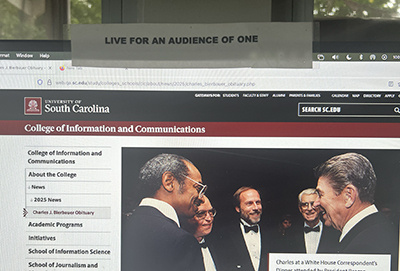
When I started at the SJMC as a part-timer in early 1996, one of my jobs was to figure out this new thing called the World Wide Web. But with only a few hours a week to devote to it, I couldn’t do much. Then Charles arrived.
Charles immediately understood where the web was headed and made me the full-time webmaster. Back then, there wasn’t a communications team; it was just the two of us. Charles didn’t want a site full of static information; he wanted news. So he became my writer. Then he nudged me to write, too — which was terrifying, because writing for Charles Bierbauer was no small thing. But I learned so much from him.
Since I was always the one behind the camera when he was dean, I don’t have photos of the two of us together. What I do have is a saying that’s been taped to my desk or computer for years. I first came across it in a Bible study, and while it spoke to my faith, it also reminded me of my work with Charles. "Live for an audience of one." I used to tell people, “If Charles was happy with my work, then I knew it was good.”
Even after he retired, I’d still ask him to write “a few words,” and he did. In fact, we exchanged several emails the morning of the day he died. I reminded him that the 10th anniversary of the new building dedication was coming up, Sept. 16, and asked if he wanted to write something for it.
He responded: "Write something? You were always good at persuading me to. I’ve taken retirement rather seriously. It was one reason for getting out of town. Not wanting to be a hovering presence. It wasn’t my show any more. But what did you have in mind? Maybe a 'does anyone remember this guy' piece? I was, by the way, encouraged to see Shirley’s high point was relocating the school/college. Mine, too, though it took too long."
A colleague said it was just like Charles to quietly slip away on a Friday night to bury the news. That was so him. He was a very private man.
So, I’m sorry Charles if this is all a little much. Over the years you and I put together a few of these memorial pages, and I think you knew that if I was still around, I’d end up doing yours. I just hope I make you proud.
And yes, there are a lot of us who will always remember you.
